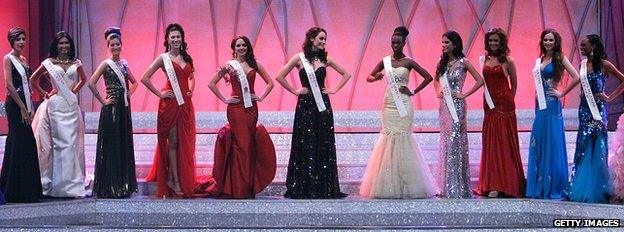The Response: Is there a problem with Miss World?
- Published
- comments

Following our piece from classicist Mary Beard, who argued that it's hard to get angry about the Miss World competition these days, two readers give their response.
After supporting the famous protests against Miss World in 1970 as a teenager, Mary Beard admitted in her A Point of View piece that the event no longer made her angry.
The pageant had become a "scantily clad, tabloid version of University Challenge" with many of the contestants students or graduates with a wide range of ambitions and literary interests.
Beard's attitude to the whole idea of how people used their own bodies had changed. "The less I see my own body as a positive asset, the less I have wanted to interfere with what other women choose to do with theirs," she noted.
But here Julia Long, a protester against the current incarnation of Miss World, argues the contests still reinforce sexism.
And Sabrina Sixta, a recent entrant to Miss Universe Canada, suggests beauty pageants are not what the protesters think.
The activist
As one of the organisers of the protest outside the Miss World contest, I was disappointed that Mary Beard did not take the trouble to inform herself of the nature of the protest before giving her opinions on its supposed redundancy.
If Prof Beard had read our flyers, she would have seen that the protest was directed against what the contest represents, rather than the contestants. We certainly do not see Miss Venezuela as "the enemy" - rather, we oppose the objectification of women that such contests perpetuate.
Our chants make the links between this kind of objectification and other aspects of women's inequality. The "freedom bin", into which we threw lads mags and scalpels, symbolised new forms of sexism that have become normalised in the intervening years between this and the original 1970 Miss World protest. .
Prof Beard claims that the Miss World contest should no longer be a priority for feminists, but merely refers to her own comfort with her ageing body, and new-found personal tolerance of what she sees as the "bodily choices" of others.
While I'm delighted that Mary Beard is comfortable in her body, to conclude from that that battles around female objectification and sexual commodification have been won betrays a serious ignorance of the ongoing issues of ageist and sexist discrimination faced by women in relation to their appearance.
The beauty industry continues to grow even in times of economic downturn. Increasingly intrusive and risky procedures have become far more common since the original Miss World protest in 1970 - from facelifts and silicone breast implants to "nasal tip enhancement", the "internal bra" (a "revolutionary surgical breast support"), labiaplasties and "breast boosters".
Painful practices such as waxing - not only of legs but also underarms and pubic area - have become near-compulsory for young women, alongside dieting, eyebrow threading, spray tans, false lashes, stilettos and visits to the nail bar and the hair salon.
Rather than opposing the dictates and pressures on women to appear a certain way, Prof Beard argues that it is simply a question of "making those constraints work for you". For feminists, however, simplistic notions of "free choice" are seldom an adequate way of explaining gendered social phenomena, and individual adaptations are rarely a solution to structural inequalities.
For those of us protesting outside the Miss World contest, there is a clear relationship between beauty pageants and a massive industry which thrives on selling a message to women of their inherent physical inadequacy and unattractiveness. Beauty contests normalise the judging of women as objects, in spite of the PR-driven efforts of the organisers to make us believe otherwise.
The groups protesting outside Miss World - the London Feminist Network, Million Women Rise, OBJECT, and UK Feminista - campaign energetically on a range of issues including violence against women and justice for rape victims; the government's spending cuts; abortion rights; and the normalisation of pornography and the sex industry. We don't see the Miss World contest as unrelated to these injustices.
An important dimension to the protest was the presence of several of the women from the original 1970 action, who joined a new generation of feminists singing, chanting and laughing. Prof Beard may indeed have "sold out on feminism" and become more conservative in her late middle age, but luckily, others have not.
The mathematician/beauty queen
I was in Miss Universe Canada and I feel as though there is a major misconception about beauty pageants.
Mary Beard, like most people who don't know much about the pageant industry look at the Miss World competition as women flaunting their bodies in bathing suits (and just recently becoming "swamped by a kind of high-minded worthiness").
But the Miss World and Miss Universe pageants, alike, are competitions. There is technique in everything from walking with grace to holding oneself in the perfect stance. There is a reason why the prettiest girl doesn't always win.
Prof Beard talks about the attempt by producers to focus more on the charity and intellectual aspect of the contestants, but from experience I honestly feel this is primarily in response to the type of girl that seems to enter pageants these days.
They are usually what we would call a "go-getter". Let's take Oxana Federova, Miss Universe 2002, as an example. She resigned as Miss Universe because she wanted to finish her law degree.
There are many contestants who work hard at college and volunteer in their community. Participating in a beauty pageant is simply another thing to add to their list of achievements.

For some young contestants, beauty pageants are like any other interest
Prof Beard also talks about the "importance of physical fitness and social responsibility" not quite ringing true.
But there's nothing to back up this claim. If the strict rules that automatically eliminate any contestant who is anorexic or bulimic aren't convincing enough, maybe an example will help.
The week prior to the Miss Universe Canada pageant the contestants were going out to eat for breakfast, lunch, and supper (and no, we weren't fed celery and alfalfa sprouts). So how did we keep fit? Most girls kept fit by training for marathons or even playing soccer.
People should get their facts straight before criticising another pageant. And Prof Beard should think twice before saying that if we really want to be international lawyers, like so many of us claim, why don't we just work at it, rather than enter a beauty contest?
Well I'd just like to use myself as an example - I graduated from high school with the highest average and entered university early to study mathematics. I still get the top of my class, participate in many volunteer projects and I have only just turned 19.
Please don't tell me that I am "not working at it".